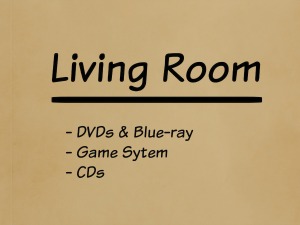Tips to Declutter Your Home Before a Move

Moving can be a very stressful time in life. Along with all the hassle of changing addresses, arranging help and getting utilities lined up, there is all the stuff in the house.
The easiest thing to do is get rid of all non-essentials before you have to start packing.
No one wants to move boxes that have been sitting fully packed from the last move, it’s too discouraging!
And if you wait for the last minute, then all the random things end up in boxes and garbage bags to be trucked over to the new place. It’s not a pretty picture: opening the “oh what’s in here?” box only to find loose change, dirty dishes, paperwork you needed last week and the shoes that disappeared during the move.
Yes, I’ve been there.
Set aside time each day to declutter and pack 3 – 4 boxes. Have a give-away box and trash bag with you. Be sure to give yourself enough time to pack the boxes and get everything cleaned up and moved out. It’s best to take one small area at a time so a job isn’t left half done and begin to feel overwhelming. Pack up everything that is non-essential to daily life. You can use a very minimal amount of kitchen items for a month and the kitchen will be easier to keep clean and maintain that sense of calm that we long for when we are facing big changes.
How to approach decluttering before a move
First off, determine what categories of your things you won’t need to have access to until after you are in your new house:
- Books
- Collections
- Decor
- Serving/Entertaining items in the kitchen
- Canning/food preserving supplies
- Camping/outdoor gear
- Toy sets
- Hobby supplies
- Holiday items
- Etc.
It’s easiest if you list them out, so you have a game plan to follow.
Set up 2 boxes and a trash in front of you:
- Packing box
- Donate box
Work on one category until it is completely sorted and packed.
Look carefully at the items in front of you. Pull out just the ones that you know you absolutely want to see them in your new home. These are things that you use regularly or love.
After you’ve pulled out only the ones you determine worthy of the effort of moving with you.
And it is a lot of effort! Packing, labeling, carrying, unpacking, finding a place for, etc. Don’t put all that effort out for just any old thing: if it’s not worth that effort, it’s time to let it go.
Look at what is left. Determine the best way to let it go: donate it or trash it.
How to organize boxes as you pack
Fine a place in your home to stack up packed boxes. Each time you get one packed, labled and taped up, move it over to the stack. This will keep your work space clear and easy to move around in.
When labeling your boxes, have the room it belongs in big letters or circled so it’s very clear for anyone who is helping you move into the new house. List the basics of what is inside the box, no need to be super specific, but knowing what category of items is inside the box is very helpful:


Don’t have a garage sale
Just be done with clutter and don’t keep things around for a garage sale. Every now and then, a garage sale may be worth it, if, for instance, you are following the Dave Ramsey/Financial Peace University program and rocking the debt snowball. But other than that, garage sales are not worth your time and energy. According to NPR (National Public Radio), the amount of time spent having a garage sale (cleaning, organizing, pricing, selling and then donating excess) earns one less than minimum wage. If you have a couple large items, feel free to try Craigslist in a “priced to sell/ cash only” deal so remove the item ASAP. But otherwise, use your free time for something more enjoyable and donate all your excess immediately.
Let go of sentimental items that bring you down
Often in our storage areas, we hide away sentimental items. But I would like to challenge you on this. If the item truly is a treasure, why do you not treasure it by enjoying it every day and displaying it in your home? Is it really that special, stuffed up in the attic, in a box, where you don’t think about it? Getting rid of an item, does not get rid of the memory or the person with whom the item was once connected. If needed, take a photo of it, journal about your memories of the item, and then bless someone else with it, by donating it. Please do not keep items that bring pain. If the person who gave it to you caused you pain, that pain comes out with each thought of the item. Release it. Free yourself. These sentimental items are the most challenging to let go, but be honest with yourself: Does it get used? Does it make you smile? Is hanging on it helping you? Is hanging on to it helping anyone else?
Use it as an opportunity to live without excess toys
If your child is over 2 years old, have them participate. Make it a game/ experiment. Have them pick out a 5 – 10 toys to keep out and play with, or a small amount of a set (we want it to fit in a shoe-box size container) and pack the rest away. See what you all think about limiting toys to a small amount. Tell them it’s the game of minimalism and get their opinion after the move is complete. You may be pleasantly surprised at how content they are with so little.
Pretend your living out of your suitcase
Pick out enough clothes to last 1 – 2 weeks and pack up the rest. Imagine packing for a 2 week trip. Once you have those items, set them aside and declutter as you pack up the rest of your wardrobe. This is a perfect opportunity to experience what a simple capsule wardrobe would be like, plus, it will be much easier to keep up on the laundry and keep your room neat and clean. 2 weeks of clothes should very easily fit into your dresser, giving your room a motel-like simplicity.
Take time out to recharge
Decluttering and packing is emotionally, mentally and physically exhausting. Avoid spending more than 3 hours at a time working at this. Reward yourself when you get a group of boxes packed or finished packing a certain room. Sit down to read a book, have a cup of tea or chat with a friend. Knowing you have a reward waiting for you at the end, gives extra motivation for getting the job done.
Keep cleaning supplies handy
Leave cleaning supplies as the last thing to pack, as you will need to use them to clean the house, unless you are hiring a cleaning service (which, if the move is creating a lot of stress in your life, a cleaning service is a worthwhile investment.
Keep up on your maintenance routines
Be sure to do the dishes in the morning and evening, tidy the counters and wipe down the stove and counter tops. Keeping up with the daily chores keeps the home in a manageable state, which is extremely important while you pack.
Do you have any good packing or moving hacks? Please share in the comments!


I’ve just done a BIg move, and wish I would have seen this article before I did! I actually followed a lot of your suggestions, but One thing that I would have done differently would be to rent a storage unit for boxes as I packed them. we lived in a very small house, so i didn’t have any place to put boxes. by the end i was literally living in a maze with small corridors. this was not only stressful, but prevented me from seeing lots of little things that still needed to be tossed or packed.
That’s a great idea Winter, thanks for sharing!
Im hoping to movein a couple of years to a smaller apartment and have akready started collecting boxes to pack my stuff in. Thanks for this article as it will help me plan my packing well in advance as well as declutter as i go along. Im tempted to try a pscking party like The Minimalists but cant find the motivation and energy at the moment.
Thanks so much for this comment. It’s a very good idea!!
Simple logical advice, i love it. Im about to sell and move so glad i signed up To get your tips.my life is already feeling better with the little decluttering i have done so far. Thanks ☺
Some good advice here. A few things come to mind:
– if there’s room by your house, rent a PODS unit rather than a stationary storage unit. It’s convenient to put your packed boxes straight in there, and it will then be towed to your new home where you have time to unpack it.
– Keep a box (or two) marked clearly in red on all sides for things you will need in the first 48 hours of arriving, such as salt, unpacking equipment, food and really basic kitchen supplies (buy duplicates if it helps).
– check if the moving company supplies vertical wardrobe moving containers that you can just transfer all your hanging clothes into (saves SO much time)
– secure the doors and drawers of furniture by using a plastic clingy black wrap designed for the purpose. It’s quick on and off, and secure, and won’t leave marks.
– be realistic and start packing early enough. You have many more boxes of stuff than you think you have (think 3 or 4 times as much). Also, be realistic about what you’re going to use before the move: for example, you won’t read many books, so don’t leave them out.
– Pack a suitcase as if you’ll be away for a week, including toiletries, underwear and all other every-day essentials.
– move your packed suitcases and immediate-use red box in your car. Take the cases straight to the bedroom and the red box to the kitchen on arrival.
– reconstruct and make up your bed first, before you do anything else – or maybe second, after starting and loading the fridge/freezer.
– plan your meals for 2 – 3 days. We bought breakfast sandwiches, cart lunches and cheap Asian dinners. Have easy snacks, fruit and drinks on hand.
Totally agree with making of the bed !, nothing worse than that being the last thing to do
Oh yes to making the bed first – the last thing you want to do when you’re exhausted is go into the bedroom and realise you can’t just go to sleep! This is my number one tip!
I have moved 11 times in the last 30 years. I keep a notebook of important info phome#s etc. When packing boxes i NUMBEr them and indicate room they will go in but i keep a detailed lst of whats in each numbered box so that i can easily find a box im looking for. Or i can tell somone else which box i need. Mark each side of the box also so if they are stacked you can still find easily.
Very heLpful informatio. Lots of useful tip. I am packing in preparation for what i hope will be the last move. Looking To livIng cltterfree and more carefree Retired life. The onE area causing concern is my love of sewing. Over the years i have accumulated quite a fabric stash. I have given a lot of thought to DOWNSIZING but have not come up with a CONCRETE plan. This is goong tog require some dedicated help
I agree about categorizing the things in the house when decluttering. I suggest making a checklist or a schedule because you can’t finish all the work in one day. Great blog by the way and thanks for sharing this information!
Great tips for sure. Also, I categorize by space. Then each space I start with prioritizing decluttering and pack only items I don’t need in the next 30 days. That all to storage. I have multiple lists. 1 for packing, 1 for who to contact and what for and 1 for the major timeline. I used to use an interactive spreadsheet but I like a google sheet checklist better. Just easier to check it off manually and keep a clipboard. On my contact page I also wrote notes for new utilities and contracts. I used to carry a small notebook that had a pocket for these things and keep moving receipts in the pocket if it’s a job change related one and I can write off for taxes.
Freezer meals is one more tip. A lot of Costco and grocery delivery. Take frequent breaks or you’ll burn out. You’ll be more refreshed and make better decisions.
Hi
I’ve been knocked sideways by the emotional impact of moving with older children. Not sure what to keep or Bin or charity. Moving to a smaller house and for a fairly short time is also tricky.
Photo albums! I was a huge scrap booker back in the day. What should I do with all those?